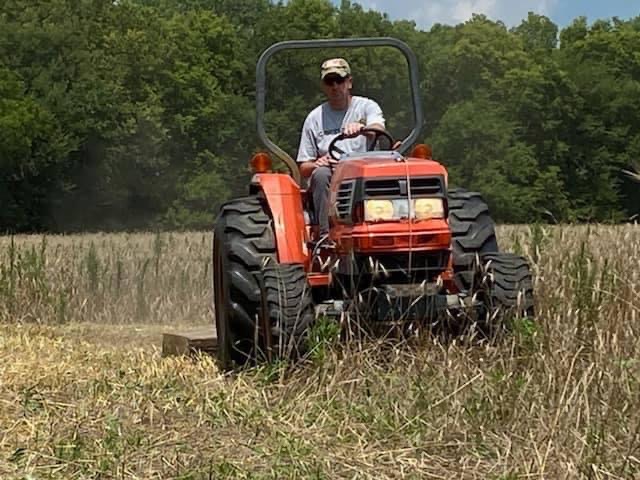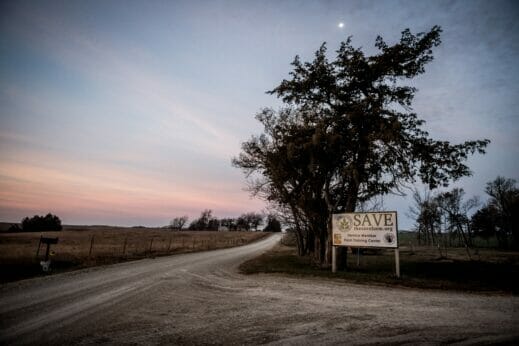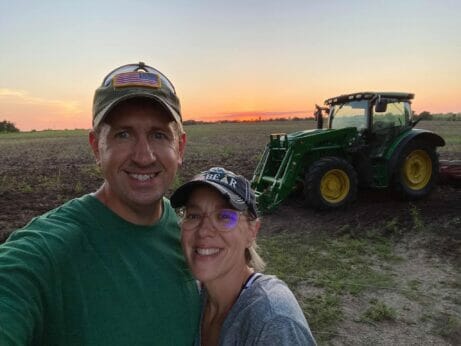SAVE Farm has existed as a non-profit since 2016 to help former soldiers navigate life after service.

Joe Graham gave nine years of his life to the war in Afghanistan. Once he got home, he was faced with an overwhelming task: finding a new purpose and new community while battling symptoms of PTSD.
“As a soldier, you serve, and you often see a lot of bad things,” he says. “Coming back into civilian life isn’t easy. I struggled for many years.”
It was on a patch of 308 acres outside of Manhattan, Kansas where life turned around for Graham. That’s where he found SAVE Farm. SAVE, which stands for Servicemember Agricultural Vocation Education, has existed as a non-profit since 2016 to provide veterans with training in sustainable and regenerative farming, paired with support services in mental and physical health.

SAVE Farm. Photography by Daniel J. Videtich ofThe Nature Conservancy.
SAVE’s program, which is five months long, aims to support veterans in their transition to civilian life and prepare them for a career path in agriculture, if they so choose.
“I think this is appealing to a lot of veterans,” says Graham. “It’s peaceful because it’s just you and the animals and the land. You get your hands dirty, but you put in the work to make sure the land can sustain itself.”
Graham, who enrolled in the program with his wife Jennifer in 2021, is working to build a farming business. Since the farm’s inception, more than 50 veterans have graduated from its program. Roughly 75 per cent of its graduates have chosen to pursue a profession in farming.
At a time when more than a third of U.S. farm and ranch operators are over 65 and the rate of suicide for veterans is 1.5 higher than that of the general population, SAVE Farm founders say the non-profit offers multiple wins.
SAVE is the brainchild of retired colonel Gary LaGrange and his daughter Shari, who saw results from providing soldiers with beekeeping training and therapy at nearby Fort Riley army installation in north central Kansas. Tod Bunting, SAVE’s CEO and co-founding member, says he’s seen the positive transformation that happens at the farm.
Having also served in the military, Bunting believes there is a great need for SAVE’s model to be replicated across the country. “I believe that our veterans are in crisis, due to the challenges that come with service,” he says. “This is important work, especially for those with the deepest wounds, the ones that may fall through the cracks, who need a tighter safety net and who need to know people care for them.”
Three part-time farm staff and two AmeriCorps staff help manage SAVE’s operations, where they have goats, sheep, ducks, cattle and rabbits. They grow corn, sorghum, soybeans and wheat, as well as barley, triticale and alfalfa for cover crops. An orchard currently grows hazelnuts and blackberries. There’s also an apiary for beekeeping and a high tunnel, which is a teaching station for horticulture.
But Bunting says it’s the partnerships between Kansas State University, the USDA’s NCRS, the Kansas Association of Conservation Districts, The Nature Conservancy and other farmers that have allowed the non-profit to build a network of people to design the curriculum and provide specialized educational sessions. Those who enroll in SAVE’s comparative agricultural programming are taught all parts of farming, animal science and plant science with sustainability top of mind. Regenerative practices such as no-till, cover crops, diversification, grazing for wildlife and managing for pollinators are all integrated into the farm’s programs.
And, in keeping with a vision to grow the program and graduate 100 veterans a year, the organization hopes its programs will become an accredited university under the G.I. Bill, meaning the government would cover the cost of enrollment.
Heidi Mehl, The Nature Conservancy’s director of Kansas Water and Agriculture, would also like to see the non-profit get that accreditation. Mehl, who has worked with SAVE to design its curriculum and incorporate regenerative practices, says the farm’s work can make a substantial environmental impact.
“We’re hoping for ripples in a pond,” says Mehl. What she means is that, ideally, a graduate incorporates those practices on their farm, and then their neighbor sees that they work and also adopts them. Studies have shown that farmers and ranchers are more likely to try something different on their land if they see their neighbor do it.
Those regenerative practices, such as rotational grazing, cover crops and promotion of soil health, are key to building resiliency in the land, says Mehl, highlighting a third benefit to the farm’s model.
“I know how important farming is to our economy and to our local communities in Kansas,” she adds. “These regenerative practices are just another tool we can use to ensure our communities are strong.”

Joe and Jen Graham at SAVE Farm.
That approach to environmental stewardship and conservation are something that Joe and Jen Graham try to honor in their own farm work. Currently, in an “incubation” period on SAVE Farm, the pair is raising a flock of 40 chickens—or what they hope is a humble beginning of a thriving farm business. By spring, they’re aiming to have tripled their flock, selling their eggs at local farmers markets. Later, they plan to incorporate some livestock they can raise.
Beyond being the springboard for the couple’s business, the Grahams say the SAVE Farm and its community are the reason the future looks bright.
“This has given my life a sense of direction, an opportunity to heal and find my new life in this world,” Graham says. “It’s a lot of hard work, but it’s a good life.”
We need many more farms like this one.
Fantastic.
Veterans need lot of support from the Government to settle in life. Please elucidate some of the supports available now which would stimulate others.
Few success stories in different kinds of farming may please be published. .